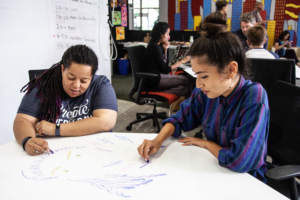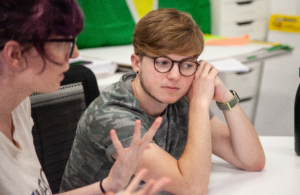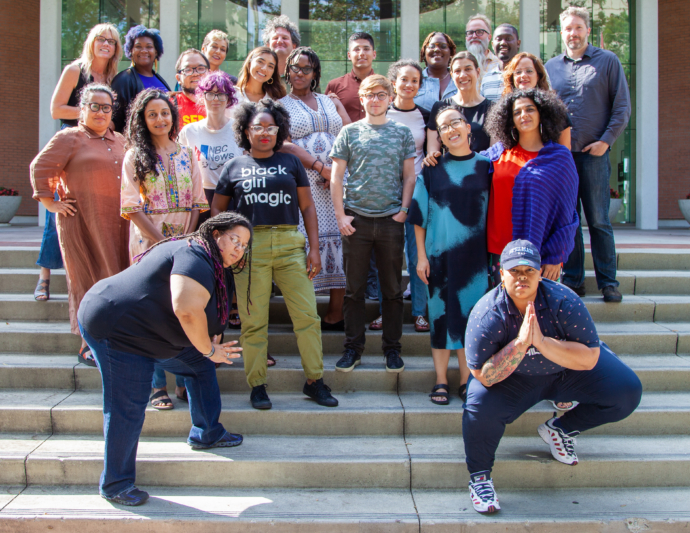By Neha Komatreddy
When my roommate asked me about my time spent at the AnnLab Civic Media Fellowship Week, I did not know where to start other than to say that being there was one of the greatest opportunities I have ever had.
I had been working as a student at the lab for about three weeks before the big kick-off event from Sept. 15-18, when civic media fellows — past, present, remote, and residential – came together to celebrate outgoing fellows and welcome new ones.
The convening included thought-provoking world-building activities, storytelling, fellowship mapping and planning, intimate dinners and a larger USC community event of fellow-led lightning talks around topics like why self-care is necessary if you want to help others, how our concept of guilt relates (or doesn’t) to our concept of justice and the role of design in black liberation movements.
The final day was an “Unconference,” a series of informal sessions created by and for individuals who don’t have to be experts on the topic they want to explore, with the aim being to start a dialogue, not finish a conversation. The options ranged from offerings like, I Don’t Know What I’m Doing and Maybe That’s Okay, to Public Speaking, to How To Sustain Ourselves Financially, and more, all of which encouraged creativity and gave the fellows permission to unwind.
I was able to attend two: Haunted Spaces + Archiving and Imposter Syndrome. Haunted Spaces highlighted the missed stories that a lack of archiving and indexing creates in the world and how it relates to otherworldly notions of ghosts. Recounting impactful ghost stories and supernatural sightings brought the group closer together. Imposter Syndrome encouraged attendees to understand how different cultural standards put certain groups at a higher risk of feeling unworthy of the academic, social, or professional settings they are in, and how people can challenge some of their behaviors in the present. It was one of my favorite parts of the week because it encouraged me to look at my own life through a new lens.

Some of the biggest insights came from seemingly random conversations throughout the week. For example, when illustrator and current residential fellow Ashley Lukashevsky and I shared an elevator, I got to learn about the picture book she is illustrating that teaches children concepts about race. I was reminded of the fact that children’s books often do not touch on subjects like ethnicity and gender, and became excited to know that the next generation will have access to books like these that teach inclusivity and empathy from a young age.
One of my favorite conversations was with remote fellow Tanya DePass, a Chicago-based activist for diversity in the gaming industry. An avid gamer herself, Tanya understands firsthand the problems that arise from being underrepresented and/or mis-represented in games. That is why she collaborates with game companies to ensure the dialect, speech, and appearance of characters, as well as the role and the way they show up in the game, truthfully portray the marginalized groups of people she reads for and ensures that they do not perpetuate negative stereotypes.
Tanya believes the most important thing companies can do “is to have more diverse writers and illustrators and to start the sensitivity reading early in the process.” Getting the opportunity to talk to Tanya helped me to understand how inclusivity and cultural understanding needs to be at the forefront of every step of a project, namely game design, from conception to finished product.
As an Annenberg student, the emphasis on collaboration over competition really resonated with me. Amidst the talk about how each person got to where they are, resources and contacts were always shared with anyone who could benefit from them.
One example of this was when I listened to AnnLab executive director Colin Maclay, who has a podcast, and current NY-based fellow Jackson Bird, who has a YouTube channel, share their experiences around podcasting.

As a fan of Jackson’s educational videos, which I find to be uplifting and inclusive, it was inspiring to get a peek behind the scenes and witness the energy in person.
Finally, what stood out to me was the power of a collective network to collaborate and help create individual and larger visions.
The world we live in lives, breathes, and eats media. However, news outlets and television studios that have such a pervasive influence on our cultural, societal, and political attitudes do not reflect the identities or experiences of non-dominant narratives. Spending time in a room with such a brave group of people who are setting agendas for mass movements and shifting culture in a way that will make history books, demystified and laid out how meaningful change happens in real time.
When I asked Colin what it felt like to lead the fellowship program and he said, “I don’t feel like I am in charge. I just feel like I am one of the many instigators that are helping these incredible fellows [tell their stories].”
I am definitely honored to be one of those instigators as well, and look forward to applying what I learn from them as I continue to create, consume, and interact with media.
